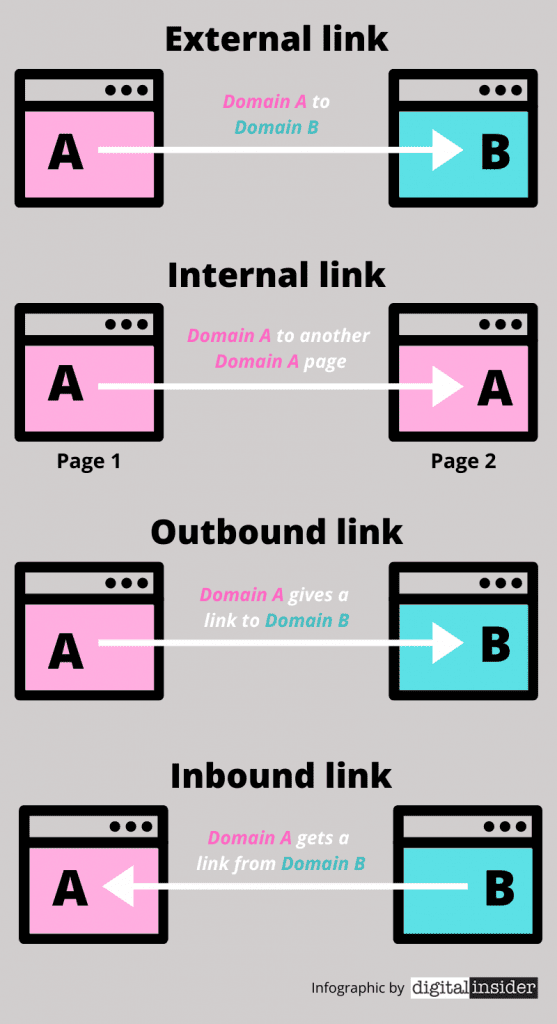Do you know creating content that answers your readers’ questions doesn’t guarantee that it will rank well? To outrank your competitors, you must establish authority and the only way to do that is by adding authoritative links to your content.
SEO experts state that link building can be the most difficult Search Engine Optimisation practice. Some companies don’t know how to evaluate a site to ensure that the links they use are of the highest quality. So how do you choose the right sites for your link building?
Our article will give you some tips to assist you. Read on to find out how to choose high-value sites for link building.
What Are Links?
Links are references to data that readers can follow if they click on it. It will open a new tab in their browser so they can read more about the topic you mentioned in your content. There are two types of links:
- Inbound links: These links are also known as backlinks or external links and are similar to citations. An inbound link will transfer users to another website or page if they click on it. Search engines treat inbound links similar to votes for popularity and importance on the internet.
- Internal links: An internal link refers your viewers to pages on the same domain. The links connect internal pages on your website that you want your viewers to see. Internal links can transfer users to a landing page, product page or blog on your website. A large number of internal links that point to a particular page on your site will signal to search engines that the page is important. Internal links must be done as naturally as possible so that it’s not considered spam by search engines.
More about link types

Why Link Building is Crucial For SEO
Link building is the process of getting other websites to link back to your site to improve your ranking. When done correctly link building can boost referral traffic and increase your site’s authority.
Google’s algorithms are harsh and complex, so it makes it difficult to rank high. However, link building is crucial for SEO because links signal to Google that your site provides quality content that’s worthy of citation. Sites with more backlinks to authoritative pages have a higher ranking compared to those who don’t.
Here is a list of benefits link building provides:
- Increases web traffic
- Improves relationships within your niche
- Boosts revenue opportunities and sales
- Leads to higher site metrics
- Improves SEO scores
- Improves your site’s credibility
Link Building Strategies
Unfortunately, you can’t simply add links to random pages or content and call it a day. There is a specific way you should include your links, so it’s done as naturally as possible. Here are some tips to start adding links to your site:
- Create content that’s compelling and unique so other sites will want to link to it. Content creation also gives you an opportunity to add external links to your page as citations.
- Build your network by putting your products and services in front of influencers in your niche such as people with a high social media following or bloggers.
- Ask friends or partners to consider using your site to link to. However, make sure that they link to content that’s relevant to the information you’ve provided on your site.
5 Tips to Choose a Quality Site for Link Building
Before you decide to include a link in your content you must first identify the quality of the site you’re linking to. Here are some tips to evaluate site quality before you start link building.
1. Website Ranking and Trust
It’s important to evaluate the site’s ranking and trust because it may affect your own site’s ranking if you add poor links to content. Most SEO experts suggest using online tools to measure the website’s value.
These online tools evaluate a site’s ranking and trust. You don’t want to run the risk of including a link that’s considered spam or that could infect your computer or other devices with viruses. Site ranking and trust tools can give you data such as the number of clicks a site has or the number of sites that have linked to the page.

2. Niche Relevance
Nothing is stopping you from linking to a site that’s outside of your niche but there must be a reason for it. Linking to sites that aren’t relevant to the content you’ve provided can affect your ranking. For example, you don’t want to link to a page about cat food if you’re talking about dog food.
When you use relevant links they may:
- Improve your organic ranking
- Google may index your site faster
- Gain more referral traffic

3. Check The Content
Content refers to written and visual content on your site. You must create content so you can start link building. However, there are some sites that you should avoid linking to, such as competitors within your niche. If this happens you’ll be helping them rank which you don’t want to do.
Additionally, you should avoid linking to any site that violates Google’s guidelines because it can lead to penalties. Links that may get you into trouble are:
- Link wheels
- Paid links
- Link farms
These links are considered black hat link building and are used to try and find loopholes to improve ranking. You don’t want to risk penalties for black hat link building. Always use white hat link building techniques that will improve your ranking organically.
4. Is the Site Heavily Monetised?
How aggressive is the page you’re linking to monetised? Some advertising may not affect your ranking, but pop-up ads shouldn’t distract the reader from the main topic. Additionally, some ads may slow down a user’s device which may cause them to opt-out of the link. A site that’s full of affiliate links can also be a red flag.
Furthermore, you should avoid sites that directly advertise dofollow links in their guest posts because Google can identify them immediately.
5. Reputation
You should link to sites that not only have a reputation but must also have a positive one. Choose sites to link to that have a strong social media presence on Twitter, YouTube, or Instagram. What’s more, you want to identify the type of accounts that are following the site. Are they fake accounts or are they real companies and people following the page?

Websites that have fake accounts following them could suggest that they’re scam sites so you should avoid linking to them at all costs. Another way to check whether the site has a real following is to check its engagements. Ensure real people and companies are commenting and liking posts from the site you choose to link to.
Final Thoughts
Not sure if the sites you’ve chosen to link to are quality pages? Then Digital Insider is here to assist you with a foolproof link building SEO strategy. We use the E-A-T (Expert, Authoritative and Trustworthy) method to find high-quality sites to link your content to.
You can see how important this is for your pages, right? Now, if you’d like assistance with quality link building strategies, then contact us on 0459 845 633 or request your strategy. In a digital age with millions of websites on the internet, we want to help you get ahead of the pack.
